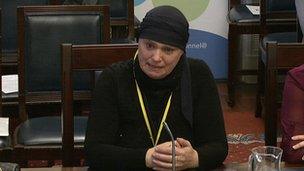Ann Travers gives evidence
- Published
- comments

Ann Travers appeared in front of the committee
From the moment it was confirmed Ann Travers would be giving evidence on Jim Allister's Special Advisers Bill, it was clear that today's session of the Finance and Personnel Committee would be more heartfelt and emotional than the average Stormont conclave.
Ann Travers has spoken strongly before about how her grief over her sister Mary's murder by the IRA in 1984 was compounded by the appointment of Mary McArdle as the culture minister's special adviser.
Wednesday had the added dimension that she found herself across the table from representatives of the party who gave Ms McArdle the job.
Before Ms Travers and Robert McCartney's sister Catherine took their places, the commitee had been hearing from some academics and the Human Rights Commissioner, Professor Michael O'Flaherty, on whether Jim Allister's proposed ban on former prisoners with serious convictions becoming advisers would be "human rights compliant".
Concerns on this score have been raised previously by the Attorney General John Larkin, and MLAs heard differing views on whether, if approved, the Special Advisers Bill would be open to challenge under either the European Convention on Human Rights or "emerging UN standards".
It was all very learned, but paled by comparison when Ms Travers asked where the human rights of victims figured.
She turned Mitchel McLaughlin's talk of a "hierarchy of victims" on its head, arguing that her family's sensitivities had not been given any consideration and that, as a victim, she felt herself placed on a rung on the ladder far below the victim makers of the Troubles.
Ms Travers wants Mary McArdle to provide her with full details about her sister's murder, but Sinn Fein's Mitchel McLaughlin responded by indicating that anything of that kind would not be forthcoming before there's a comprehensive agreement on dealing with the past.
Truth
Like the families now challenging the senior coroner's decision to suspend inquests into the deaths of their loved ones , Ms Travers finds herself embroiled in the current piecemeal approach to the past.
Whether a comprehensive truth commission-style body will ever be agreed is open to doubt.
In the meantime, families of Troubles' victims are left clutching at whichever avenue appears open, whether it's the PSNI Historical Enquiries Team, a fresh inquest, or in Ann Travers' case the recognition offered by Jim Allister's bill.
Although the Mary Travers case has generated many headlines and sparked yet another angry debate in the Stormont chamber on Monday, the magistrate's daughter isn't the only victim directly linked to a special adviser.
Metropolitan Police bomb disposal officer Ken Howorth was killed in 1981 by an IRA bomb left in a restaurant in Oxford Street.
Inquiries
Four years later Paul Kavanagh, now an adviser in the deputy first minister's office, was convicted of the murder.
Earlier this year Mr Howorth's colleague, Peter Gurney, told me about finding the remains of his friend's body, recognisable only by a fragment of the cardigan he always wore.
Of course, Mr Howorth was just one of many victims of the Troubles killed across the Irish Sea.
Today, families in Birmingham are holding a candlelight vigil to demand an inquiry into the 1974 pub bombings.
Like other families here in Northern Ireland, the relatives of the Birmingham victims want a public inquiry.
But given the prime minister's stated position that there will be no more "open ended costly inquiries", the Justice 4 the 21 campaign looks set to face an uphill struggle.
The West Midlands police have launched a review into the pub bombings, but my understanding is that they haven't approached the PSNI for assistance.
Indeed, yet another anomaly thrown up by the current fragmentary approach to the troubled past is that if a family's loved one was killed in Northern Ireland they can try to get some answers from the PSNI Historical Enquires Team, but if the murder took place elsewhere that avenue for trying to discover the truth isn't open.